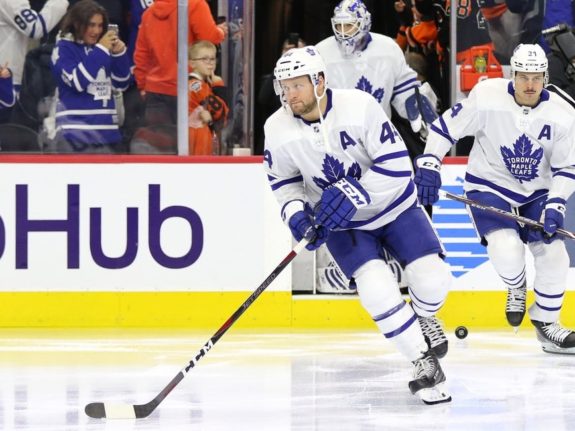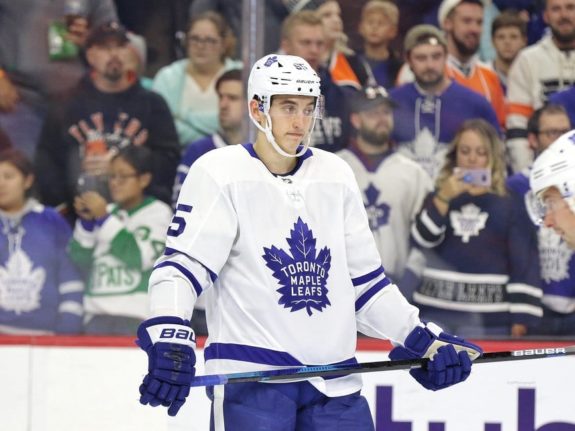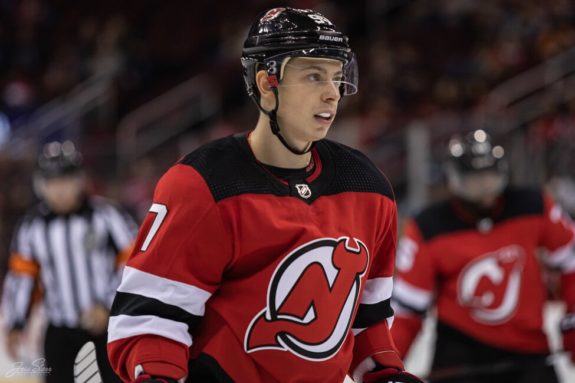
 Chris Faria
The Hockey Writers
Chris Faria
The Hockey Writers
31
Reads
0
Comments
Should the Maple Leafs Pursue KHL Star Mikko Lehtonen?
News broke Friday morning that Mikko Lehtonen, this season’s top-scoring defenceman in the Kontinental Hockey League (KHL), had agreed to terminate his contract with Jokerit Helsinki with the intention of moving to the NHL. There are rumors that the Finnish defenceman has already spoken to clubs and has a deal in place, although nothing is confirmed.
As a highly skilled and mobile left-shooting defenceman, there are both pros and cons for the Toronto Maple Leafs should they choose to pursue Lehtonen. With 17 goals and 49 points in 60 games this season, the 26-year-old is considered the best defenceman outside of the NHL and his resume speaks for itself. But would he really be a good fit in Toronto?
The Maple Leafs Are Stacked on Left Defence
Let’s begin with the first, most obvious drawback to signing Lehtonen: the Maple Leafs are already stacked on left defence right now and for the forseeable future. In fact, with a left-handed defensive corps of Morgan Rielly, Jake Muzzin, Travis Dermott, and Rasmus Sandin, they arguably have one of the better left sides in the NHL. And with four legitimate NHL blueliners, one of them (most likely Dermott) will have to move to the right side next season.

Lehtonen’ skill set is also potentially redundant — Rielly is an all-out offensive defenceman, Sandin is solid in his own end but primarily offensive, and you could probably say the same thing about Timothy Liljegren and Justin Holl on the right side. Not to mention that the Maple Leafs are already an offensive juggernaut and don’t need help putting the puck in the net. In fact, what they really need might be the exact opposite of Lehtonen — a big, sturdy, right-handed defenceman that can eat big minutes and take care of business in his own end.
Related: Muzzin Extension Could Make Rielly or Dermott Expendable
Does that mean they would have no use at all for Lehtonen? Not necessarily. For one, depth on the blue line is always a useful thing to have. We saw this season just how thin the Maple Leafs were on defence after long-term injuries to Rielly and Muzzin. Having a proven pro like Lehtonen to come in and pick up some of those minutes would be a boon for the team, and that improved depth is something they should certainly look at addressing.

On the other hand, Lehtonen was a bona fide star in the KHL and at 26 is likely coming to the NHL with the intention of playing big minutes. Given that he would be No. 3 at best on their left side, the Maple Leafs can’t really guarantee him those minutes. These are conversations that would need to be had between the team and the player, but if they were to come to an agreement, it’s likely with the understanding that Lehtonen would be accepting a smaller role in Toronto compared to a less competitive team. And that leads us to our next point: can the Maple Leafs even afford him, and how much would they be willing to pay for a depth piece?
Does Lehtonen Make Sense for the Maple Leafs’ Cap Situation?
The Maple Leafs were already in a cap crunch this season, and given the COVID-19 pandemic and the league’s loss of revenue, the salary cap is expected to remain stagnant at $81.5 million next season. With about $75 million already committed to roster players and several important pieces like Ilya Mikheyev, Jason Spezza, and Dermott to re-sign, the cap crunch may get even tighter depending on those pending deals.

In a best case scenario, general manager Kyle Dubas could get Spezza and Frederik Gauthier back on league-minimum deals while Mikheyev and Dermott may opt to bet on themselves with cheap, short-term contracts. In this hypothetical world, the Maple Leafs would be able to fill out their forward group (12 skaters) at around $57 million and their defence (5 skaters) at $14.5 million with $6.65 million committed to their goaltenders. Add on the $1.2 million that the team is still retaining on Phil Kessel, and you’ve got a grand total of just over $79 million, leaving about $2 million in cap space to potentially use on Lehtonen.
Related: Should the Toronto Maple Leafs Bet Big on Ilya MIkheyev?
You’ve then got to ask yourself a couple important questions. One, is the upgrade of Lehtonen over someone like Martin Marincin or Timothy Liljegren worth the extra strain on the already tight salary cap? Signing him may even make it necessary to move out a more established, more expensive piece like Andreas Johnsson or Kasperi Kapanen. And two, would Lehtonen even entertain an offer around $2 million?
We did see Mikheyev make the move overseas from the KHL to Toronto last year on a relatively cheap one-year, sub-$1 million deal, but Lehtonen likely has a better resume and even more suitors at this point. His situation is probably more comparable to that of New Jersey Devils winger Nikita Gusev, who signed a two-year contract for $4.5 million last summer after putting up a whopping 82 points in 62 KHL games.

Widely considered the best player outside of the NHL at that point, Gusev had plenty of interest across the NHL which clearly drove up the price. Translating KHL success to the NHL is never a guarantee (see Zaitsev, Nikita), but after a breakout offensive performance, you can bet your bottom dollar that teams will be throwing money at Lehtonen to take a top-four role and run their power play.
Related: Worst Toronto Maple Leafs Trades
The $2 million that Toronto might be able to offer is probably on the lower end of offers the smooth-skating defender would receive, so an agreement would be contingent on Lehtonen truly loving the organization and its sales pitch. But given the Maple Leafs’ cap situation and needs at other positions, it seems an unlikely fit at best.
Salary cap info from https://www.capfriendly.com/
The post Should the Maple Leafs Pursue KHL Star Mikko Lehtonen? appeared first on The Hockey Writers.
Popular Articles

















































 Blackhawks Chicago
Blackhawks Chicago Panthers Florida
Panthers Florida Penguins Pittsburgh
Penguins Pittsburgh Rangers New York
Rangers New York Avalanche Colorado
Avalanche Colorado Kings Los Angeles
Kings Los Angeles Maple Leafs Toronto
Maple Leafs Toronto Bruins Boston
Bruins Boston Capitals Washington
Capitals Washington Flames Calgary
Flames Calgary Oilers Edmonton
Oilers Edmonton Golden Knights Vegas
Golden Knights Vegas Flyers Philadelphia
Flyers Philadelphia Senators Ottawa
Senators Ottawa Lightning Tampa Bay
Lightning Tampa Bay Red Wings Detroit
Red Wings Detroit Islanders New York
Islanders New York Sabres Buffalo
Sabres Buffalo Devils New Jersey
Devils New Jersey Hurricanes Carolina
Hurricanes Carolina Stars Dallas
Stars Dallas Jets Winnipeg
Jets Winnipeg Blue Jackets Columbus
Blue Jackets Columbus Predators Nashville
Predators Nashville Wild Minnesota
Wild Minnesota Blues St. Louis
Blues St. Louis Mammoth Utah
Mammoth Utah Ducks Anaheim
Ducks Anaheim Sharks San Jose
Sharks San Jose Canucks Vancouver
Canucks Vancouver






